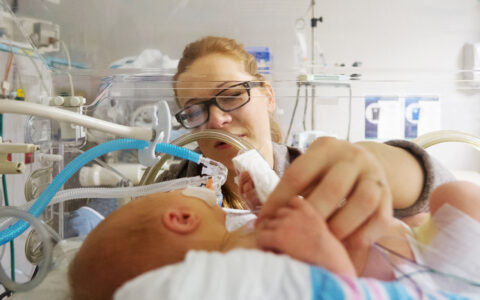Caring for infants with colorectal and pelvic floor malformations is challenging for providers and families — especially for parents as their child transitions to home. Defining clear feeding guidelines and offering better tools for parent-provider communication are two important steps toward improving care, says Eunice Huang, M.D., associate surgeon-in-chief and chief surgical quality and innovations officer at Monroe Carell Jr. Children’s Hospital at Vanderbilt.
“When patients have problems with bowel dysfunction, our challenges go beyond doing the surgery well,” Huang said. “They involve making sure that post-surgical feeding and elimination are optimized, as well as asking about other tools needed by the family as their child recovers and learns to function, based on what their body will allow.”
As a pediatric surgeon, Huang also specializes in Hirschsprung’s Disease and anorectal malformations, both of which impede normal elimination. “Parents need clear education,” Huang said. “They need our help to set realistic expectations.”
“Parents need clear education. They need our help to set realistic expectations.”
Using Tech to Collaborate with Families
Parents can be a source of valuable clinical data, Huang says, including their child’s medications, diet, evacuation, stress and any problems that arise. “A daily bowel diary with detailed information can reveal patterns,” she said. “Perhaps every time a child eats a certain food, they have difficulties; perhaps probiotics seem to help them function better.”
Huang envisions developing a user-friendly mobile app at Vanderbilt to let parents keep a daily record for their child and share it with their providers. In addition to supporting research and care planning, the app would trigger alerts in case of acute changes in the patient’s condition. She plans to apply for grant funding to develop the app next year.
Huang is a believer that enhanced information exchange can reduce hospitalizations. “With some extra advice, maybe the parent can take gentle steps at home to spare a toddler from having to come to the hospital for a bowel washout,” she said.
“With some extra advice, maybe the parent can take gentle steps at home to spare a toddler from having to come to the hospital.”
Establishing Post-surgical Feeding Guidelines
Hospital feeding guidelines to support infants who have undergone intestinal or abdominal surgery represent another important area of interest. “Developing consistent ways to manage complex patients with a multidisciplinary care team improves quality,” Huang said.
One study by Huang and colleagues, published in Nutrition in Clinical Practice, demonstrated that adherence to feeding guidelines for neonates who had undergone surgery for necrotizing enterocolitis, intestinal atresia, gastroschisis, or malrotation with volvulus was safe and did not increase adverse events, even though the guidelines recommended feeding advancement at a rate higher than typically endorsed by many clinicians. Guideline adherence also conferred clinical advantages including minimizing the likelihood of liver dysfunction.
“Developing consistent ways to manage complex patients with a multidisciplinary care team improves quality.”
In another article, Huang and colleagues addressed the lack of published guidelines for enteral feeding advancement for infants with gastroschisis and shared their experience with using a feeding guideline. “We found that a feeding protocol unique to infants with this condition reduced the median time needed for the transition to full enteral nutrition,” she explained. “It also led to no cases of necrotizing enterocolitis.”
Both studies emphasize standardization. Said Huang, “Consistent care helps promote overall learning about science and helps generate new knowledge that can be used to improve outcomes for these patients and their families.”






